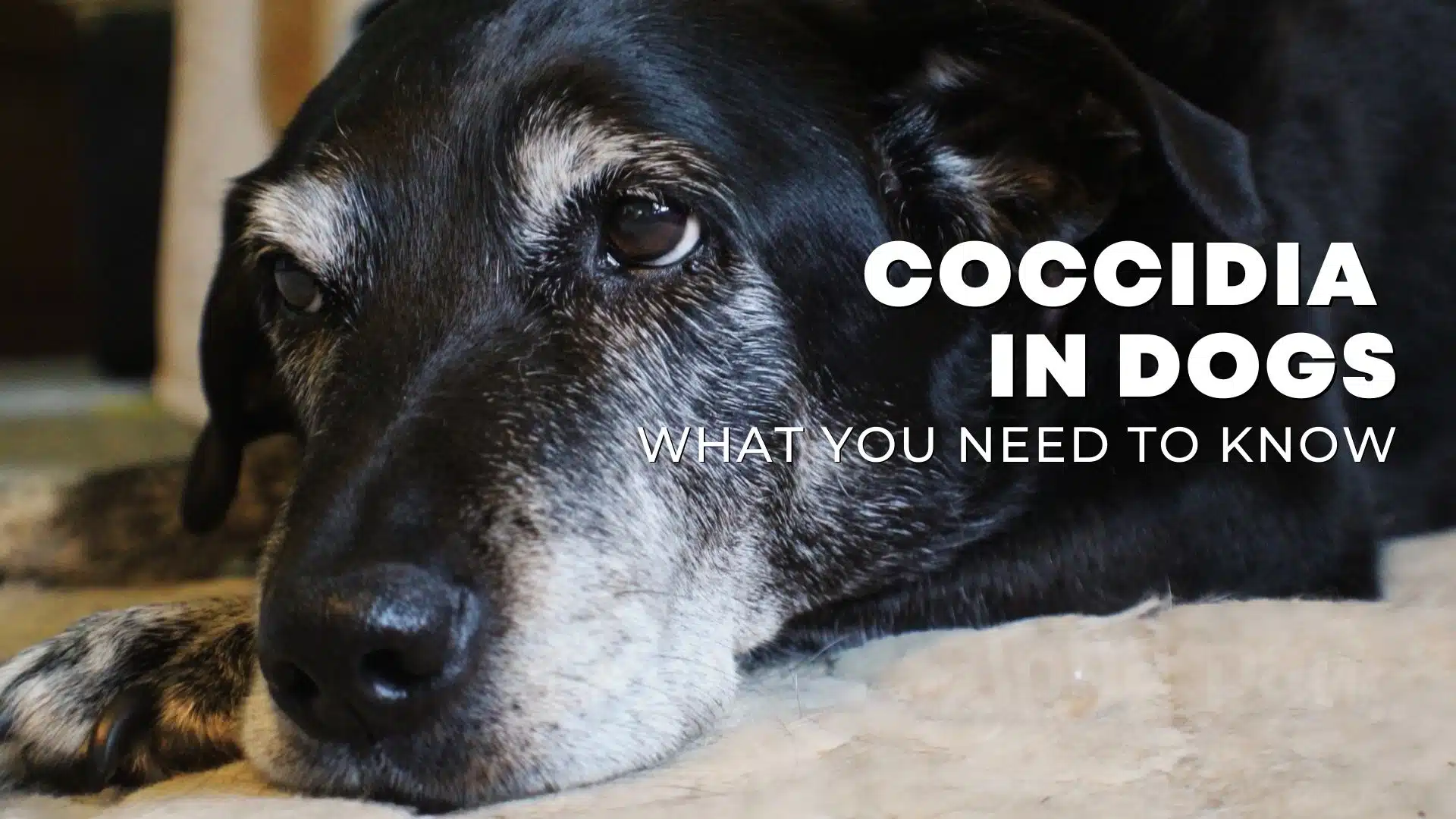


Coccidia is an intestinal parasite that can infect dogs. Specifically, it is a protozoan single-celled parasite. These parasites are microscopic meaning that they can’t be seen without magnification. Coccidiosis is the name of the condition that dogs get when they become infected with coccidia. Coccidiosis, or infection with coccidia, can cause profuse watery diarrhea and vomiting. Coccidia in puppies can be riskier because puppies are more susceptible to severe infections and dehydration. We can also see infections of coccidia in cats and kittens which can result in diarrhea.
Most species of coccidia can not be passed from dogs to people. There are certain species of coccidia that can cause infection in humans. Immunocompromised individuals may be at a higher risk of infection. If you are concerned, I recommend speaking with your veterinarian and medical doctor about your potential risk. Because every coccidia species is different, your veterinarian will be able to let you know if your dog has a species of coccidia that can be passed to humans.
There are several ways that a dog can become infected with coccidia. The main way a dog gets infected with coccidia is by ingesting coccidia organisms from the environment. A dog infected with coccidia will shed infectious coccidia organisms within their fecal material. This fecal material is infectious, and the soil where the dog defecated can become contaminated with the coccidia organisms. If your dog ingests this soil or the fecal material, it can become infected with coccidia. Dogs can also become infected with coccidia if they eat an animal, such as a mouse, that is infected with coccidia organisms.
Prioritizing your dog’s immune health is essential for a happy and active life. Discover the best products crafted to enhance your canine companion’s immunity. These top-rated supplements are enriched with essential vitamins, antioxidants, and probiotics, known for their immune-boosting properties.
The main symptoms of coccidia in dogs are gastrointestinal symptoms such as vomiting and diarrhea. Coccidia in puppies can cause more severe symptoms such as dehydration and loss of appetite. VCA specialty hospitals reported that the most common symptoms of coccidiosis in dogs are:
Anytime you notice any symptoms such as vomiting or diarrhea, it is important to contact your veterinarian as soon as possible. To learn when you should take your dog to the vet immediately, check out this article on when you should drop everything and take your dog to the veterinary clinic.
If you suspect that your dog has coccidia, I recommend scheduling an appointment with your veterinarian. At this appointment, your veterinarian will perform a physical examination on your dog. To definitely diagnose coccidia, they may recommend performing a fecal flotation test. This test looks at your dog’s fecal sample under the microscope to determine if there are parasite eggs present.
Once your veterinarian diagnoses coccidia, the recommended coccidia treatment is either ponazuril or Albon (sulfadimethoxine). These medications will kill the coccidia parasite within your dog. You should see improvement in your dog’s symptoms within a few days of treatment with these medications. Your veterinarian may also prescribe metronidazole, a gastrointestinal antibiotic, which may help decrease the amount of diarrhea your dog is experiencing.
For a dog with stomach upset, many veterinarians will recommend feeding a low-fat diet until symptoms have resolved. Your veterinarian may recommend temporarily feeding a prescription low-fat diet like Hills i/d, Purina EN, or Royal Canin GI low fat. Alternatively, your veterinarian may recommend a bland diet of boiled chicken breast and white rice for a few days.
Coccidia will usually go away with treatment with ponazuril or Albon. There are times that coccidia infection can recur. Because coccidia organisms are very resistant, they can persist in the environment for long periods of time. Your dog may become reinfected with the coccidia organism if their environment is contaminated.
Coccidia organisms are very resistant to the environment. There are very few known effective disinfectants for decontaminating an infected yard. The best recommendations for decreasing coccidia within the yard are:
To reduce the risk of coccidia in dogs, it is important to keep your yard and house clean of fecal material. As soon as your dog defecates in the yard, be sure to pick it promptly. When cleaning up the stool, wear gloves, use a plastic bag, and wash hands thoroughly after cleaning up the stool. The Companion Animal Parasite Council recommends the daily removal of fecal material from the environment to aid in the prevention of coccidiosis.
By practicing good hygiene like prompt disposal of fecal material, it may minimize the risk of transmission of intestinal parasites such as coccidia. Alpha Paw’s Magic Pee Pads have a built-in pheromone attractant that encourages your pup to go in the right place, making cleanup a breeze. These puppy pads also have a unique dry-lock polymer core that instantly transforms liquid into gel, so messes stay put and floors stay dry.
It can be challenging to keep your dog from eating poop. Poop eating is also called coprophagia. Poop eating can increase the risk of your dog developing coccidiosis and becoming infected with other intestinal parasites. One way to decrease poop eating is to keep the stool in the yard picked up promptly. You can also consider trying a product like For-Bid which is a supplement that can sometimes decrease stool eating behaviors.

The medical, nutritional, or behavioral advice we provide is intended for informational and educational purposes only. Our editorial content is not a substitute for formal or personalized medical advice from a veterinary professional. Only board-certified veterinary specialists who have examined your pet should diagnose medical conditions, provide personalized treatment, or prescribe appropriate medication. For questions regarding your pet’s health, or if your pet is exhibiting signs of illness, injury, or distress, contact your veterinarian immediately. Never disregard professional medical advice or delay in seeking it because of something you have read on our site.